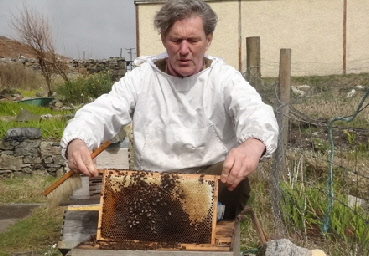Theft of rare black honey bees is serious blow to conservation efforts
12 April 2017
Police are investigating the theft of thousands of rare black bees in the Western Isles.
The two hives in Manish in Harris were part of efforts to save the threatened native European honeybee species, generally known as black bees due to their dark colouring.
Dedicated breeder, Gavin Jones, believes his hives were deliberately targeted. He was off the island caring for his dying father when thieves struck.
The 56-
Since the last Ice Age, the European dark honeybee was the dominant bee in the UK until it was brought to the brink of extinction by disease from imported Italian bees.
Now only a handful of isolated spots in the far north of Scotland are free from the Varroa parasite which decimated the original pure Scottish or British black bee.
The Manish colony would have swollen to tens of thousands of bees over the summer.
Mr Jones is “upset” at the theft after trying to increase their numbers after seven years and breeding a local “Harris” subspecies of high purity tough enough to stand up well to the Hebridean climate, flying in rain, wind and poor weather to forage in moorland and exposed terrain.
He said: “I think they were specialist black bee thieves. I’ve had breeders turning up here offering me good money for nucleus I just don’t have to sell.
“There’s not that many people breeding at this level of purity and they can’t keep
their stock clean [due to disease and cross-
“It is so hard to breed black bees up here and I had something that was useful for the whole world.”
Dr Alan Bowman of Aberdeen University who is involved in research into bees said it was a “completely baffling” crime.
The senior lecturer said: “To me, this seems to be targeted -
“Its rather completely baffling for what purpose they were stolen.
“This is quite sad when a bee enthusiast puts in time and effort and then someone has stolen them.”
The researcher said: “This is a significant loss to the bee community and to the amount of genetic material in the UK.”
A Police Scotland spokesman said a family friend last saw the hives on 14 March but they were missing when he returned to check on the property two weeks later.
He said inquiries are ongoing and anyone with information should call Police Scotland on 101.

Gavin Jones